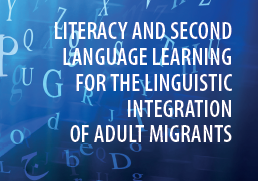Literacy and Second Language Learning for the Linguistic Integration of Adult Migrants (LASLLIAM)

The Council of Europe Education Department embarked on the Literacy and Second Language Learning for the Linguistic Integration of Adult Migrants (LASLLIAM) project to support high-quality learning environments for non- and low-literate migrants. The project culminated in the development of the LASLLIAM reference guide by a group of experts. It aims at supporting language educators, curriculum designers and language policymakers in their endeavour to design, implement, evaluate and improve curricula tailored toward the specific needs of the target learners.
The LASLLIAM reference guide
A substantial percentage of the adult migrants in a European country is non- or low-literate. These vulnerable learners are generally neglected in L2 acquisition research and not addressed in the CEFR that focuses on general language users and presupposes literacy. To support the literacy and second language learning and teaching of this group, LASLLIAM was developed. LASLLIAM is a European Reference Guide that builds on the CEFR and the CEFR Companion Volume. It endorses the communicative action approach of the CEFR and provides four-level scales up to A1 with illustrative can-do descriptors for oral and written second language learning and language use strategies. It also provides scales for the acquisition of the written code (Technical Literacy) and digital skills. LASLLIAM is available in the following languages: English, French, Italian, Dutch.
Validation of LASLLIAM
An important part of developing the LASLLIAM scales for Communicative Language Activities, Technical Literacy and Digital Skills was validating the can-do descriptors at the four levels. In the qualitative validation study teachers judged the clarity, pedagogic usefulness and relevance of the descriptors in the different scales. In the quantitative validation study, they assessed the progression line of the different scales, i.e. the difficulty level of the descriptors. Methodology and results of the validation study are presented in the dedicated report.
Piloting of LASLLIAM
The LASLLIAM reference guide was piloted in several European countries in 2022: Material developers used LASLLIAM descriptors to develop sample teaching tools, and teachers evaluated the tools after using them. You can find the report on a focus group study with material developers and teachers here. The piloting tools developed in various languages can be searched according to LASLLIAM level and domain here.
In addition, within the LASLLIAM piloting, specific tools available in 12 languages were developed for need’s analysis, placement and end-of-course exams. The LAMI-LASLLIAM Assessment Tools (LLAT) is a collection of four assessment tools for using LASLLIAM for assessment purposes within learning environments. The use of LLAT led also to the collection of multilingual samples of low literate learners’ performances at the four LASLLIAM levels, offering e.g. factual examples of what it means to perform at a given LASLLIAM level in different languages.
Impact of LASLLIAM
Implementation of the LASLLIAM reference guide already started in the 2022, the year of publication. In several countries, the LASLLIAM reference guide was actively promoted and the reception and impact of LASLLIAM was closely monitored. You can find an overview of the different dissemination and policy activities that shows the impact of LASLLIAM at the macro- meso- and micro-level in different countries here , with also the outcomes of the testimonial Writing award in Netherlands. In addition, several video testimonials provide a nice glimpse of how LASLLIAM was received and valued by stakeholders from Austria, Belgium, Germany, Italy, Norway and the U.K.




